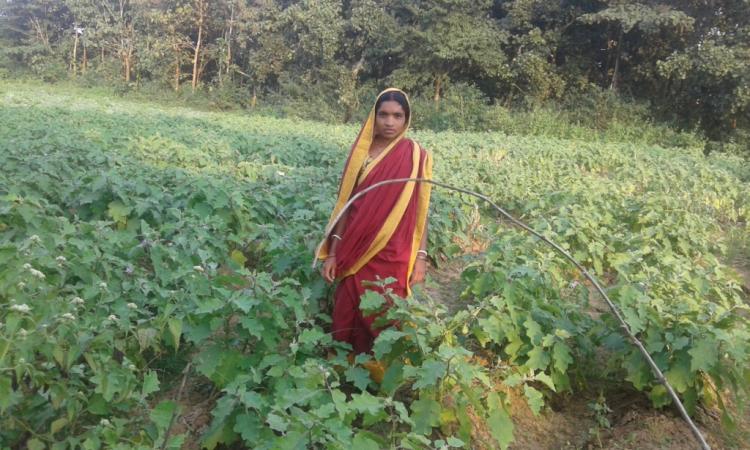
Pitidri is a nondescript village that dots the rainshadow area of Purulia district in West Bengal. Droughts are common here even when the area is endowed with above average rainfall of over 1300 mm a year. Until some time ago, Urmila Mahato, a 42-year-old farmer from Pitidri had been struggling to ensure her family’s food security. Her family could barely sustain on the 18 quintals of paddy her small farm of two acres could produce in a year. Only one acre of her farm could be used for seasonal farming of vegetables due to lack of irrigation facilities. Urmila also had a few livestock of local breed.
Urmila’s family of four, for the most part, had been dependent on their earnings from daily wage labour in nearby cities. The Mahatos belong to the backward kurmi caste, a community that lies at the lowest rung of the socio-economic hierarchy in the area. Even after back-breaking work, Urmila’s family was able to earn only Rs 40,000 annually. Of this, only a fifth came from the farm. Urmila’s dependence on rainfed agriculture in the absence of irrigation facilities and her continuance with conventional and often poor agricultural practices led to poor farm productivity.
“I was looking for a way to turn around my farming and use the resources on my farm well, but I had no clue on how to go about it,” says Urmila. The failure to conserve water and the rise of input costs in farming prevent farmers like her from achieving food security around the year. Fortunately for Urmila, those dark days are over. In spite of the general crisis in the farm sector, Urmila’s farm has had a good yield. She got a net return of over a lakh which amounts to a nine-fold increase from her farm income last year.
Urmila’s family of four could manage to earn around Rs 32,000 a year from daily wages and Rs 8000 from seasonal cultivation last year. An economic impact analysis was conducted in this case for the last one year and the net income came to over one lakh.
Sustainable farming to the rescue
How did she make this possible? She got in touch with the Green College run by the Society for Promotion of Wastelands Development (SPWD), an NGO working on reversing natural resources degradation. Supported by Welthungerhilfe, a German non-profit organisation, the programme at Green College encourages small and marginal farmers to adopt sustainable agro-ecological farming practices. They also help develop the farmers as social and environmental service providers in agriculture. Apart from these, the college supports those who possess the potential to grow and become agricultural entrepreneurs.
Before joining the Green College, Urmila was an active member of a women’s social group engaged in promoting savings and thrift. She joined as a “bio-input trainee” at the Green College early last year (2017) and was trained to prepare bio-inputs using farm and animal waste like crop residue, cow urine and cow dung. She was provided skills in farming practices like drip irrigation in the cropping system, intercropping, manure mixed cropping, integration of subsystems and the maximum use of bio-input fertilisers. After switching from the conventional method of farming, a substantial change in her farm productivity was noticed which reflected on her family’s well-being as well.
Nutrition garden as an alternative
Now she cultivates a range of crops in her “nutrition garden” (as the college names it) such as radish, tomato, cauliflower, brinjal, ladies finger, beans, onion, bottle gourd and pumpkin for self-consumption as well as for sale. She utilises the waste from these crops in the vermi bed and practises azolla cultivation to improve the health of the farm and also to feed her livestock and ducklings. A free-floating water fern, azolla is a green fodder grown on the water surface. Her family produces meat and eggs from their poultry, which is sold in the local market.
“The limitations of conventional agriculture are being overcome by adopting sustainable agro-ecological farming systems like interlinking the agricultural subsystems. In Purulia, trainee farmers like Urmila are working towards ensuring better outcomes from their farming systems,” says Sanjay Gorai, principal, Green College, SPWD.
“Green College’s mission is to reduce poverty by improving livelihood with the help of its skill enhancement training courses in agriculture and allied sector. The SPWD, in adherence to this mission, has put its persistent effort to fulfill the objectives of Green College and we are glad that trainees like Urmila are doing better farming in their own right,” says Sharat Singh, programme director, SPWD.
“The training has helped me reduce my cultivation costs as I use organic fertilisers like bio-compost, vermicompost and liquid manure. Now I have sufficient food for my household as well as livestock, which also contributes to my source of livelihood around the year,” says Urmila.
“Urmila’s nutrition garden now provides a solution to the food and nutrition problem by increasing household food availability,” says Nakul Mahato of PRAVAH, a Purulia-based NGO.
Empowered farmer, efficient farmer
Urmila is a far more confident woman today. She is connected with the block agriculture department to expand these innovative practices to a wider scale within her farm as well as among other farmers of her village. Her household’s economic condition has improved considerably. She believes that this is largely because she adopted new techniques in her farming system.
“An advantage of the training is that higher productivity of food is possible even in small patches of farm holdings with the right kind of inputs. Now my household’s economic condition has improved and we do not need to go out for wage labour. My children can focus on their studies at high school and college,” says Urmila.
Most agricultural practices reflect the various social and traditional aspects of different societies. “Urmila’s kitchen garden practice serves as a valuable storehouse for preserving and transferring crops, knowledge and the skills from one generation to another,” says Gorai.